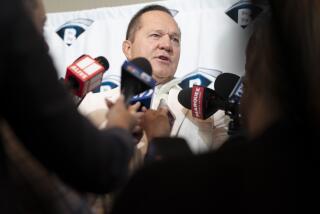Owners Still Not in Agreement : Baseball: They claim they are closer on revenue sharing and vow for no lockout in ’94.
- Share via
After two days of virtually around-the-clock meetings, major league owners adjourned late Thursday night without resolving deep divisions between big- and small-revenue teams or reaching an agreement on increased revenue sharing among the 28 teams.
They said, however, an agreement is close and discussions would continue by committee.
Dodger President Peter O’Malley, reached at the Kohler, Wis., resort where the meetings were held, said he was hopeful of a resolution within 15 days.
“We’re trying something new, and it’s a complicated challenge,” he said of the search for a revenue-sharing formula. “We’ve made extraordinary progress. I think we’re on the right track. We had a healthy exchange here, and I’m hopeful of a resolution in two weeks, maybe 15 days.”
It is not clear how a delay will sit with the players’ union, which has threatened a September strike unless legitimate bargaining talks begin soon.
However, possibly hoping for a no-strike pledge from the union, Richard Ravitch, president of the owners Player Relations Committee, said late Thursday night that the owners would not stage a lockout at the start of the 1994 season and would not attempt to unilaterally impose a new compensation system after the current one expires on Dec. 31.
Ravitch said he was disappointed the owners didn’t reach an agreement on increased revenue sharing but that there was no purpose in setting an “artificial deadline” for reaching an agreement. He said that the start of the ’94 season would not be affected if an agreement was reached in September or later.
Bud Selig, owner of the Milwaukee Brewers and president of the executive council, said he, too, was disappointed by the failure to reach an agreement but added that there is always “a certain amount of trauma” when trying to change “long established systems.”
Selig said he was still confident an agreement between the big-revenue and small-revenue clubs could be reached, but refused to predict when. The two coalitions will appoint committees to continue the dialogue.
Any revenue-sharing agreement among the owners would be contingent on the union accepting a compensation system based on a salary cap and designated percentage of revenues going to salaries, a plan the union is unlikely to approve.
Meeting jointly and in a series of separate caucuses involving the big- and small-revenue teams, the owners went past midnight Wednesday, resumed talks Thursday morning and were coming up on midnight again when they adjourned.
While specifics remained hazy late Thursday, it seemed clear that Ravitch’s initial plan, which would have reportedly cost each of the big-revenue teams about $8 million more than they now share, was unacceptable to those teams and continued to be reworked in a series of proposals emerging from the caucuses.
The coalition of big-revenue teams, clearly large enough to prevent the 21 votes needed for an agreement (though no vote was taken during the two days, Selig said), was composed by the New York Yankees and Mets, the Dodgers, the Toronto Blue Jays, the Colorado Rockies, the Florida Marlins, the Texas Rangers, the Chicago White Sox, the Baltimore Orioles and the Boston Red Sox. The Angels were involved in some of the big market caucuses, but not all.
It is believed that Ravitch, who claims the clubs are spending 58% of their 1993 revenues on salaries, favors a plan designating 50% to salaries, but owners were unwilling to risk a $100,000 fine by discussing specifics of the various proposals.
“There’s been a lot of progress,” Minnesota Twin General Manager Andy MacPhail said at the end of another long day. “This isn’t the end of it by any stretch.”
Bill Giles, president of the Philadelphia Phillies, concurred. “We’re close,” he said, referring to a possible agreement.
More to Read
Go beyond the scoreboard
Get the latest on L.A.'s teams in the daily Sports Report newsletter.
You may occasionally receive promotional content from the Los Angeles Times.










